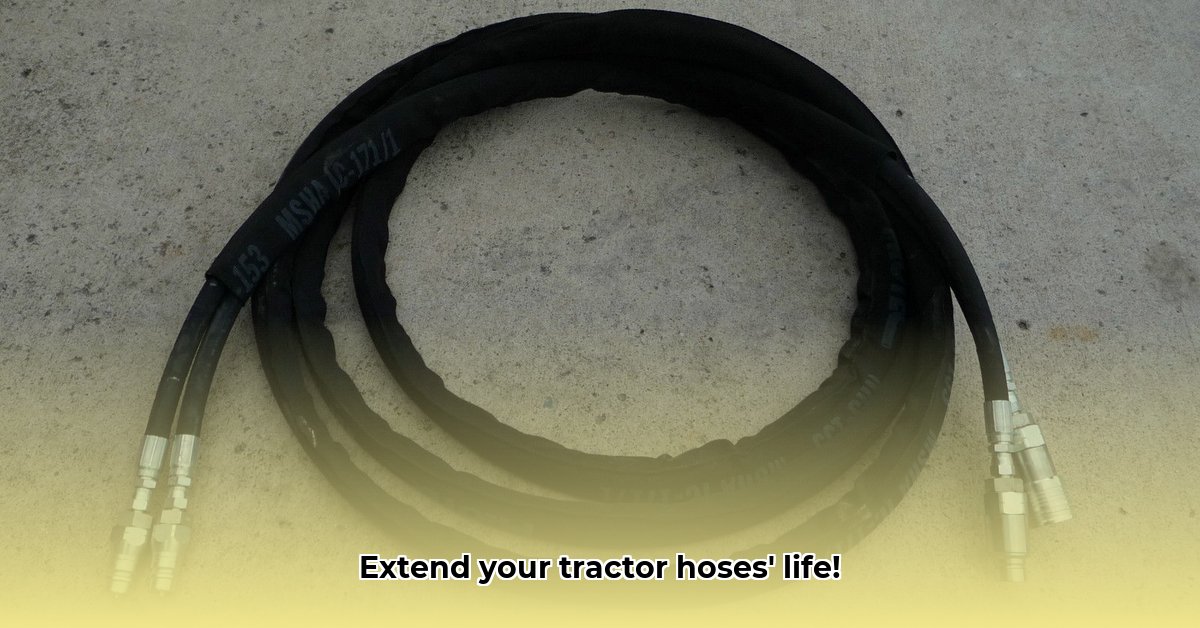
Keeping your farm equipment in top condition is crucial for efficiency and sustainability. This guide focuses on maximizing the lifespan of your Tractor Supply hoses, saving you money and minimizing environmental impact. We'll cover hose selection, maintenance, and responsible disposal, empowering you to make informed decisions for a thriving and eco-conscious farm. For more information on related equipment, check out our Tractor Supply Resources.
Choosing the Right Hose for Your Needs
Selecting the appropriate hose is paramount. The wrong choice can lead to leaks, premature failure, and increased costs. Consider these factors:
- Durability: How tough does your hose need to be? Will it face abrasion, kinks, or exposure to harsh weather?
- Pressure: Can the hose withstand your irrigation system's or sprayer's pressure? Over-pressurization leads to early failure.
- Chemical Compatibility: Will the hose come into contact with fertilizers or pesticides? Incompatible chemicals can degrade the hose.
Tractor Supply offers various hose types:
- Rubber Hoses: Affordable and versatile for general watering and light-duty tasks. However, they may not handle high pressure or harsh chemicals effectively.
- Polyurethane Hoses: More durable than rubber, resisting wear, chemicals, and weather extremes. Ideal for heavy-duty work like chemical spraying and high-pressure irrigation. The higher initial cost is often offset by their longer lifespan.
- Reinforced Hoses: Built for high-pressure applications, offering superior strength and longevity. They're the best choice for demanding systems but come with a higher price tag.
Choosing the right hose is an investment in both your farm's efficiency and the environment. A longer-lasting hose means fewer replacements, reducing waste and saving you money in the long term. Isn't that a goal worth striving for?
Extending the Life of Your Tractor Supply Hoses
Regular maintenance significantly extends hose lifespan. Here's a straightforward approach:
- Monthly Inspections: Carefully examine your hoses for cracks, cuts, bulges, or other damage. Addressing minor issues early prevents major problems. A small crack ignored today could become a significant leak and a costly replacement tomorrow.
- Proper Storage: Store hoses in a cool, dry location, away from direct sunlight and harsh weather, loosely coiled to prevent kinks.
- Careful Handling: Avoid dragging hoses across rough terrain or sharp objects. Treat them with care to prevent damage.
- Post-Use Cleaning: Rinse hoses after each use to remove dirt, chemicals, and debris, preventing buildup that accelerates degradation.
Remember, preventative maintenance is far more cost-effective than emergency replacements. It’s a simple, effective way to practice sustainable farming.
Sustainable Farming Practices with Hoses
Sustainable agriculture prioritizes responsible resource usage. Here’s how hose management contributes:
- Invest in Quality: Higher initial costs for durable hoses are offset by longer lifespans, reducing replacements and waste.
- Repair When Feasible: Minor damage may be repairable, extending hose life and minimizing waste.
- Responsible Disposal: Explore recycling options for your old hoses. Contact your local waste management facility for guidelines.
Hose Selection Guide: A Summary
This table summarizes the key differences between hose types:
| Hose Type | Material | Pressure (psi) | Chemical Resistance | Best Uses |
|---|---|---|---|---|
| General-Purpose | Rubber | 50-150 | Low | Light watering, general use |
| Chemical-Resistant | Polyurethane | 100-250 | High | Fertilizer and pesticide application |
| High-Pressure | Reinforced Rubber | 200+ | Moderate | High-pressure irrigation, sprayers |
Remember: Tractor Supply's staff can provide personalized advice to meet your specific needs and budget. Don't hesitate to ask for their expertise.
Sustainable Hose Selection: A Deeper Dive
Before choosing a hose, carefully assess your needs. What tasks will the hose perform? What pressure and chemical exposure will it encounter? Understanding your needs ensures you select an appropriate, long-lasting hose, minimizing waste and maximizing efficiency. A poorly chosen hose can cost more in the long run.
Consider sustainable hose materials beyond traditional PVC or polyurethane. Bio-based polymers may offer a more environmentally friendly choice. Always check the manufacturer's specifications and warranties for compatibility with your specific chemicals and applications. Responsible sourcing affects your environmental footprint.
Hose diameter is crucial for water efficiency. Choosing the right diameter optimizes water pressure and flow rate, minimizing waste and maximizing irrigation efficiency. Oversized or undersized hoses are inefficient and can lead to increased water usage and potential damage.
Remember to consider the entire hose lifecycle: from manufacturing through disposal. Favor hoses made with recycled materials and those that are themselves recyclable at the end of their life.
The staff at your local Tractor Supply store are a great resource. They can help you choose the right hose for your needs, providing advice tailored to your specific farming practices. Sustainable farming practices are within reach – with the right information and the right tools.